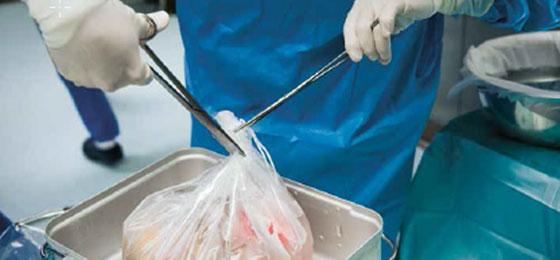When helping isn’t enough

A study in Lausanne has been looking at the role of patient organisations in the debate about organ donation. Its preliminary findings show that without strong partnerships, it is difficult to have any political impact. By Irène Dietschi
They’re called "AGIR", "A Coeur Ouvert" or "PromOrgane" – and they’re all patient organisations in western Switzerland campaigning for more organ donations. Today, patients are playing an increasingly active role in medicine. They promote clinical research, link up with partners from industry and engage in political lobbying. Are the organ donor organisations also profiting from this trend?
This question is being investigated by an interdisciplinary study led by the sociologist Raphaël Hammer from the Haute Ecole de Santé Vaud in Lausanne. Also involved are the historian Vincent Barras from the Institute for the History of Medicine and Public Health and Manuel Pascual from the Transplant Centre at Lausanne University Hospital (CHUV). They are analysing historical documents to see how organ donation has developed into a socio-political issue in Switzerland. These documents are taken from hospital archives, the archives of "Swisstransplant" (the Swiss National Foundation for organ donation and transplantation), medical journals and the general press. The researchers are also investigating the role of patient organisations and are concentrating on western Switzerland.
Their initial results are rather sobering: “Patient organisations don’t seem to succeed in getting the topic of organ donation into the public sphere as effectively and as visibly as the "Positive Council" managed to achieve with HIV, for example, says Hammer. To be sure, the fifteen associations that were interviewed for the study are all very committed. They help those who’re affected, they organise holiday camps, concerts and events, and they send out internal newsletters and set up stands in public to get their message across. All the same, they have hardly any impact on the public debate. Most of them have very meagre financial resources and very few personnel, and their actions depend on the initiative of a few members. What’s more, their actions are locally based, with coalitions between them cropping up only rarely. Plans for a national umbrella association were abandoned years ago. Often, it’s very personal motives and stories that lie behind these solo efforts. The founder and president of "A Coeur Ouvert", for example, said in an interview with the researchers that he was involved because he wanted to give back something for the "gift" of an organ he had received. “I was given help, so it’s logical for me to help others now”.
Dreadful donor statistics
It’s an honourable stance. But in the public sphere, skilful lobbying is what’s needed. Hammer suspects that the Positive Council has been so successful because those behind it – HIV sufferers, supported by a well-organised gay community – have conducted a united campaign. The situation is different with the organ donor organisations. They lack almost everything they would need to be able to close ranks. They are also divided in their strategic approach. Some of the interviewees support the "consent solution" as provided for by the Swiss Transplant Law – in other words, organs may only be taken from a deceased person when express consent has been given. Others, however, are in favour of the "opt-out solution", which means organs can be extracted automatically unless someone has expressly forbidden it.
Nevertheless, they all have one thing in common: most patient organisations have difficulty with the neutral, cautious policy towards organ donation shown by the federal government. In their eyes, the current campaign motto of Swisstransplant – “Have you ever thought about the topic of organ donation?”– doesn’t go far enough. “Neutrality is useless when it comes to organ donation”, said one interviewee to the researchers. The dreadful statistics for organ donation in Switzerland would seem to confirm his opinion.
Irène Dietschi is a freelance science journalist with her own agency in Olten.(From "Horizons" no. 103, December 2014)